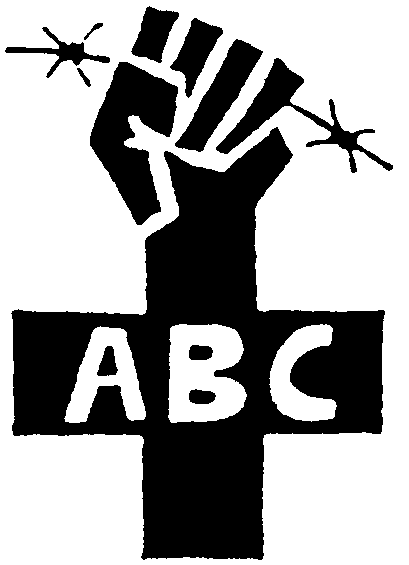About the ABC
The Anarchist Black Cross was originated in Tsarist Russia to organise aid for political prisoners. In the late 1960s the organisation resurfaced in Britain, where it first worked to aid prisoners of the Spanish resistance fighting the dictator Franco's police. Now it has expanded and groups are found in many countries around the world. We support anarchist and other class struggle prisoners, fund-raise on behalf of prisoners in need of funds for legal cases or otherwise, and organise demonstrations of solidarity with imprisoned anarchists and other prisoners.
Follows us on:
 @BrightonABC
@BrightonABC
 Brighton ABC
Brighton ABC
 The Bottled Wasp
The Bottled Wasp
Disclaimer
The listing of any prisoner or any activities on this site is for information purposes only, and should not be construed by any state organisation as representing our active support for their actions or those activities.

This work is licensed under a Creative Commons Attribution-Noncommercial- Share Alike License.
You are free to reuse anything here but only for non-commercial purposes. Follow the link for more information
Using Internet Explorer to view this site? It's best viewed with:

Human Rights Are Scrapped In Britain
Justice Minister Chris Grappling’s declaration in early October that if still in power following a general election next year the Conservative government will withdraw completely from the European Convention on Human Rights (ECHR) reflects a shift to the hard right in British politics and a warning shot that not even a basic recognition of universal human rights in the treatment of usually the most disempowered and disadvantaged groups in society will prevail.
The British government has already breached ECHR rulings in relation to the rights of prisoners to vote and the lawfulness, or unlawfulness, of holding life sentence prisoners in jail until they die, and it is the treatment of prisoners that essentially characterises the conflict of the British government with the European Court.
The treatment of prisoners generally is usually an accurate barometer of the social and political climate that prevails in the wider society, and within such a total institution like prison where the imprisoned are held in a condition of absolute powerlessness and civil death, a hardening of social attitude and political climate regarding “law and order” inevitably finds expression in more repressive prison regimes with a diminishing regard for any abstract notion of human rights. In times of economic “austerity” with it's potential for social unrest there is always an increased scapegoating of unpopular (as defined by the media and political establishment) and marginalised groups, and this often assumes it's most vicious expression and influence in the treatment of society's most disempowered and demonised group – prisoners.
Recent highly critical reports on the treatment of prisoners by the Inspectorate of Prisons and the Prisons Ombudsman describe a straight forward warehousing of prisoners in deteriorating conditions and under regimes that amount to permanent lock down. The liberal element of the establishment, which includes the prisons inspectorate and ombudsman, attribute worsening prison conditions to government financial cut-backs and a reduction of “front-line” prison staff, whilst Justice Secretary Grayling has declared it is his deliberate intention to “get tough” with prisoners and make prison regimes more punishment-based and repressive. Either by deliberate design or a starving of resources prisons are being reduced to their original hard edged function of punishing the “undeserving poor”. The psychological damage inflicted on prisoners as a consequence of “tougher” regimes is reflected in increasing levels of suicide and self-harm, and a growing population of seriously mentally ill prisoners. In some prisons, especially the urban local remand jails, an atmosphere and environment exists that is reminiscent of the Victorian prison system – a human, man-made hell overcrowded with an underclass of the most socially improvised and disadvantaged. The hard-core “career criminal” that once went to jail as an “occupational hazard” has been increasingly replaced by the social consequences and products of hopelessness: the drug addicted and the insane. The Victorian work-house, asylum and “clink” (local Victorian lock-up or jail) have been resurrected as a singular institution within which the undeserving and damaged poor are contained and warehoused. The increasing privatisation of these institutions suggests a sort of Victorian-age laissez faire capitalism has returned with a vengeance. Any concept of human rights in such an environment is meaningless, and so Chris Grayling is determined to create a legal vacuum around the treatment of the imprisoned. Last year he removed an important legal front in the struggle for prisoner's rights by stopping legal aid for prisoner litigation cases. This effectively turned the clock back to the pre-1980s and before the important Tarrant ruling that finally allowed prisoners access to the courts to challenge abuses of power by the prison system. Now prisons and those operating them are again legally untouchable and in terms of the ECHR it will soon be the government that defines our human rights and what constitutes a breach of them. Considering that Britain is one of the worst violators of the ECHR the future doesn't bode well for the health of civil liberties and human rights in Britain if such rights are to be defined by those who repeatedly violate and abuse them.
The scapegoating of marginalised groups like prisoners and using them as a pretext to remove a commitment to a European-wide human rights act has ominous implications for society generally, and especially it's poorest and most disadvantaged members who in a ruthless neo-liberal and globalized economy are beginning to experience third world conditions of existence and a contempt for their human rights.
John Bowden 6729
HMP Shotts
October 2014
More of John Bowden's writings are available here.


